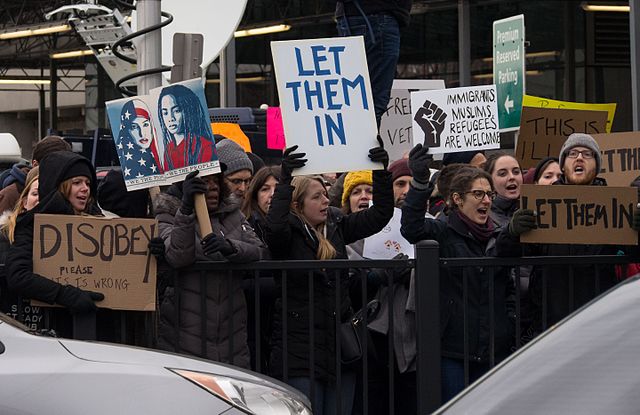
Note from Kathie: Wherever possible, we attempt on this blog to provide psychological perspectives on violence and nonviolence. Today, we share this slightly condensed Open Letter from Canadian Psychologists regarding Donald Trump’s travel ban.
“We as Canadian professors of psychology and practitioners condemn the executive order signed on January 27, 2017, to ban people from specific countries from entering the U.S. We also condemn the right wing rhetoric, anti-Muslim, anti-immigrant, and xenophobic actions that are dominating political discourse in the U.S. and some European countries.
[We] believe that the following principles have been well-established:
1. When people feel secure and accepted in their society, they will tend to be open, tolerant and inclusive with respect to others. Conversely, when people are discriminated against, they are likely to respond with negative attitudes and hostility towards those who undermine their right. Rejection breeds rejection; acceptance breeds acceptance.
2. When individuals of different cultural backgrounds have opportunities to interact with each other on a level playing field, such equal status contacts usually lead to greater mutual understanding and acceptance. Creating barriers between groups and individuals reinforces ignorance, and leads to mistrust and hostility.
3. When individuals have opportunities to endorse many social identities, and to be accepted in many social groups, they usually have greater levels of personal and social wellbeing. Individuals who are denied acceptance within many social groups usually suffer poorer personal and collective well-being.
In addition to supporting these three principles, we note the following:
A. Global humanitarian crises do not happen overnight. Such chaos begins in small steps, which may appear benign, somewhat acceptable and even justifiable under given conditions. The world witnessed too many humanitarian crises during the last century.
Not speaking out against such events right at the outset contributed to the escalation of evil and its dire consequences. The current immigration ban applied to seven predominantly Muslim countries (Iran, Iraq, Syria, Libya, Sudan, Somalia, and Yemen) may not be felt by majority of Canadians. However, it can contribute to the escalation of the unfair treatment of a wide range of groups.
B. Studies show that blatant “us vs. them” categorizations contribute to prejudice, discrimination, group polarization and intergroup antipathy. We argue that it is in no one’s interest to narrow the membership of “us” (e.g., Canadian, American, or European) and to widen the membership of “them” (e.g., Muslim, Mexican, members of the LGBT, feminist, and refugee communities). Such polarization leads to fear, rejection, and discrimination, with the negative consequences noted in the three principles described above.”
Signed: John Berry, Ph.D., Queen’s University; Gira Bhatt, Ph.D., Kwantlen Polytechnic University; Yvonne Bohr, Ph.D., C.Psych. York University; Richard Bourhis, Ph.D. Université du Québec à Montréal; Keith S. Dobson, Ph.D., R. Psych., University of Calgary; Janel Gauthier, Ph.D., Université Laval; Jeanne M. LeBlanc, Ph.D., ABPP, R. Psych.; Kimberly Noels, PhD. University of Alberta; Saba Safdar, Ph.D., University of Guelph; Marta Young, Ph.D., University of Ottawa; Jeanne M. LeBlanc, Ph.D., ABPP, R. Psych.

